初中英语句型转换大全教案资料
句型转换公开课教案
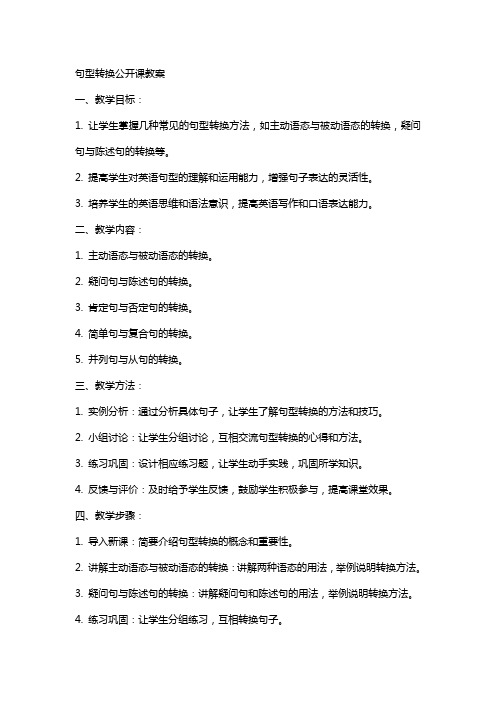
句型转换公开课教案一、教学目标:1. 让学生掌握几种常见的句型转换方法,如主动语态与被动语态的转换,疑问句与陈述句的转换等。
2. 提高学生对英语句型的理解和运用能力,增强句子表达的灵活性。
3. 培养学生的英语思维和语法意识,提高英语写作和口语表达能力。
二、教学内容:1. 主动语态与被动语态的转换。
2. 疑问句与陈述句的转换。
3. 肯定句与否定句的转换。
4. 简单句与复合句的转换。
5. 并列句与从句的转换。
三、教学方法:1. 实例分析:通过分析具体句子,让学生了解句型转换的方法和技巧。
2. 小组讨论:让学生分组讨论,互相交流句型转换的心得和方法。
3. 练习巩固:设计相应练习题,让学生动手实践,巩固所学知识。
4. 反馈与评价:及时给予学生反馈,鼓励学生积极参与,提高课堂效果。
四、教学步骤:1. 导入新课:简要介绍句型转换的概念和重要性。
2. 讲解主动语态与被动语态的转换:讲解两种语态的用法,举例说明转换方法。
3. 疑问句与陈述句的转换:讲解疑问句和陈述句的用法,举例说明转换方法。
4. 练习巩固:让学生分组练习,互相转换句子。
五、课后作业:1. 复习课堂所学,整理笔记。
2. 完成课后练习题,加深对句型转换的理解。
3. 结合所学,尝试在写作和口语表达中运用句型转换,提高表达能力。
4. 预习下节课内容,为课堂学习做好准备。
六、教学内容:1. 短语动词与简单句的转换。
2. 过去时与现在时的转换。
3. 比较级与最高级的转换。
4. 直接引语与间接引语的转换。
5. 虚拟语气与现实语气的转换。
七、教学方法:1. 实例分析:通过分析具体句子,让学生了解句型转换的方法和技巧。
2. 小组讨论:让学生分组讨论,互相交流句型转换的心得和方法。
3. 练习巩固:设计相应练习题,让学生动手实践,巩固所学知识。
4. 反馈与评价:及时给予学生反馈,鼓励学生积极参与,提高课堂效果。
八、教学步骤:1. 导入新课:简要介绍短语动词与简单句的转换、过去时与现在时的转换等概念和重要性。
初中句型转换教案模板范文
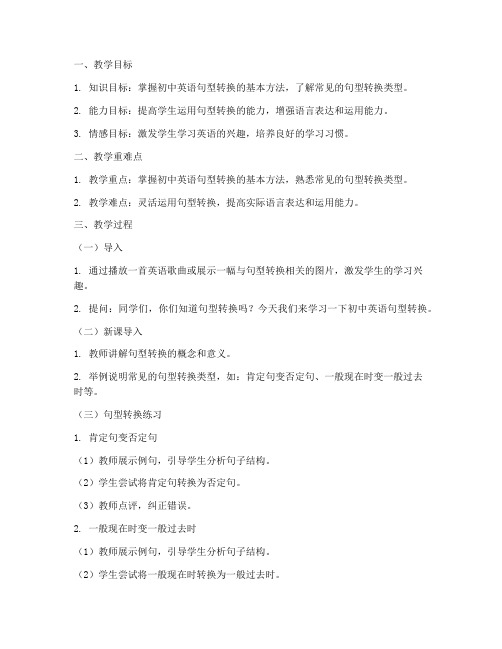
一、教学目标1. 知识目标:掌握初中英语句型转换的基本方法,了解常见的句型转换类型。
2. 能力目标:提高学生运用句型转换的能力,增强语言表达和运用能力。
3. 情感目标:激发学生学习英语的兴趣,培养良好的学习习惯。
二、教学重难点1. 教学重点:掌握初中英语句型转换的基本方法,熟悉常见的句型转换类型。
2. 教学难点:灵活运用句型转换,提高实际语言表达和运用能力。
三、教学过程(一)导入1. 通过播放一首英语歌曲或展示一幅与句型转换相关的图片,激发学生的学习兴趣。
2. 提问:同学们,你们知道句型转换吗?今天我们来学习一下初中英语句型转换。
(二)新课导入1. 教师讲解句型转换的概念和意义。
2. 举例说明常见的句型转换类型,如:肯定句变否定句、一般现在时变一般过去时等。
(三)句型转换练习1. 肯定句变否定句(1)教师展示例句,引导学生分析句子结构。
(2)学生尝试将肯定句转换为否定句。
(3)教师点评,纠正错误。
2. 一般现在时变一般过去时(1)教师展示例句,引导学生分析句子结构。
(2)学生尝试将一般现在时转换为一般过去时。
(3)教师点评,纠正错误。
(四)拓展练习1. 教师给出几个句子,让学生进行句型转换练习。
2. 学生分组讨论,共同完成练习。
3. 教师点评,总结规律。
(五)课堂小结1. 教师总结本节课所学内容,强调句型转换的重要性。
2. 学生分享学习心得,提出疑问。
(六)课后作业1. 完成课后练习题,巩固所学知识。
2. 预习下一节课内容。
四、教学反思1. 本节课通过多种教学手段,激发学生的学习兴趣,提高学生运用句型转换的能力。
2. 教师应注重引导学生分析句子结构,提高学生的自主学习能力。
3. 课后作业的布置应具有针对性,帮助学生巩固所学知识。
五、教学评价1. 课堂参与度:观察学生在课堂上的参与情况,评价学生的积极性。
2. 作业完成情况:检查学生的课后作业,评价学生的学习效果。
3. 考试成绩:通过考试检验学生对句型转换的掌握程度。
初中句型教案
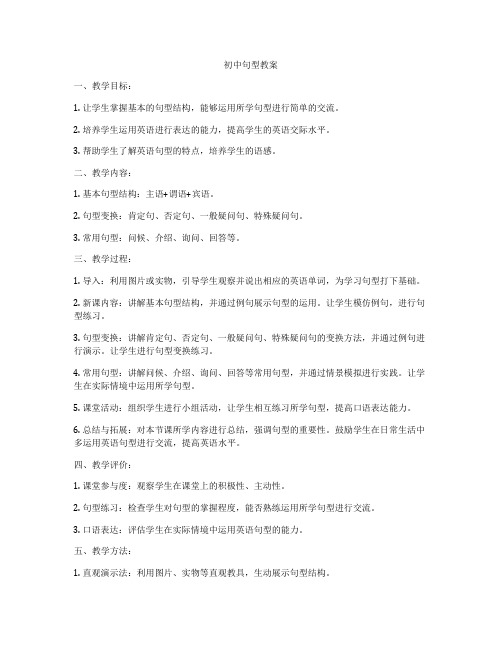
初中句型教案一、教学目标:1. 让学生掌握基本的句型结构,能够运用所学句型进行简单的交流。
2. 培养学生运用英语进行表达的能力,提高学生的英语交际水平。
3. 帮助学生了解英语句型的特点,培养学生的语感。
二、教学内容:1. 基本句型结构:主语+谓语+宾语。
2. 句型变换:肯定句、否定句、一般疑问句、特殊疑问句。
3. 常用句型:问候、介绍、询问、回答等。
三、教学过程:1. 导入:利用图片或实物,引导学生观察并说出相应的英语单词,为学习句型打下基础。
2. 新课内容:讲解基本句型结构,并通过例句展示句型的运用。
让学生模仿例句,进行句型练习。
3. 句型变换:讲解肯定句、否定句、一般疑问句、特殊疑问句的变换方法,并通过例句进行演示。
让学生进行句型变换练习。
4. 常用句型:讲解问候、介绍、询问、回答等常用句型,并通过情景模拟进行实践。
让学生在实际情境中运用所学句型。
5. 课堂活动:组织学生进行小组活动,让学生相互练习所学句型,提高口语表达能力。
6. 总结与拓展:对本节课所学内容进行总结,强调句型的重要性。
鼓励学生在日常生活中多运用英语句型进行交流,提高英语水平。
四、教学评价:1. 课堂参与度:观察学生在课堂上的积极性、主动性。
2. 句型练习:检查学生对句型的掌握程度,能否熟练运用所学句型进行交流。
3. 口语表达:评估学生在实际情境中运用英语句型的能力。
五、教学方法:1. 直观演示法:利用图片、实物等直观教具,生动展示句型结构。
2. 情景教学法:创设真实的情景,让学生在实际情境中学习句型。
3. 交际法:组织学生进行小组活动,鼓励学生用英语进行交流,提高口语表达能力。
4. 游戏教学法:通过趣味游戏,让学生在轻松愉快的氛围中学习句型。
六、教学资源:1. 图片、实物等直观教具。
2. 英语教材、参考书。
3. 录音机、多媒体设备。
4. 教学游戏道具。
七、教学步骤:1. 热身活动:利用图片或实物,引导学生用英语描述。
2. 新课导入:讲解基本句型结构,并通过例句展示。
句型转换练习教案

句型转换练习教案一、教学目标1. 了解句型转换的概念和重要性;2. 掌握常见的句型转换方法;3. 运用句型转换方法扩展句子,提高语言表达能力;4. 进行大量的练习,提高对句型转换的熟练度。
二、教学内容1. 句型转换的概念和重要性;2. 常见的句型转换方法;3. 练习题。
三、教学步骤Step 1:引入新知1. 教师向学生介绍句型转换的概念和重要性。
句型转换是将一个句子按照一定的规则转换为另一种形式的句子,可以通过改变句子的结构或者词语来实现。
句型转换在英语学习中非常重要,能够帮助我们理解和掌握更多的句型结构,丰富我们的语言表达能力。
2. 句型转换的方法a. 肯定句转否定句:在句子前面加上助动词或情态动词的否定形式,或者在动词前面加上"do not"或"does not"。
e.g. He is a student. → He is not a student.They have finished their h omework. → They have not finished their homework.b. 否定句转肯定句:去掉否定词。
e.g. He is not a student. → He is a student.They haven't finished their homework. → They have finished their homework.c. 一般疑问句转陈述句:将句子改为陈述句即可。
e.g. Is he a student? → He is a student.Did you see him? → You saw him.d. 陈述句转一般疑问句:在句首加上动词的助动词或情态动词即可。
e.g. He is a student. → Is he a student?You saw him. → Did you see him?e. 特殊疑问句转陈述句:将句子改为陈述句即可。
中考英语句型转换教案牛津版
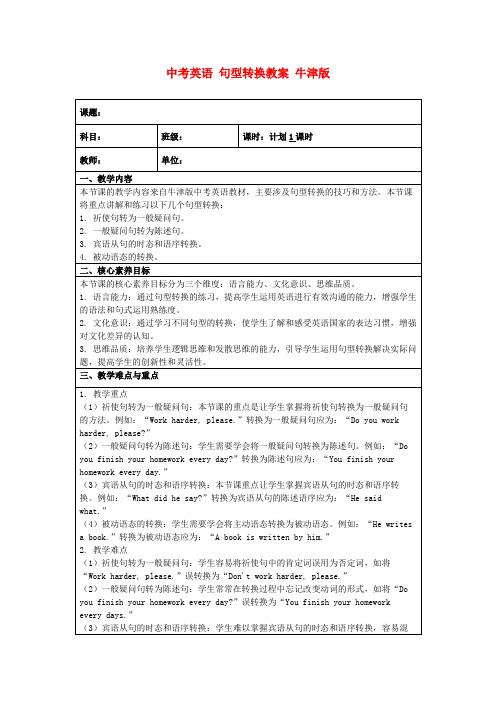
六、知识点梳理
1. 祈使句转为一般疑问句:
将祈使句中的肯定词变为否定词,或将否定词变为肯定词。例如:“Work harder, please.”转换为一般疑问句应为:“Don't you work harder, please?”
2. 一般疑问句转为陈述句:
将一般疑问句中的助动词、情态动词或be动词移至主语之前,其余部分保持不变。例如:“Do you finish your homework every day?”转换为陈述句应为:“You finish your homework every day.”
3. 宾语从句的时态和语序转换:
根据主句的时态,宾语从句的时态相应变化。一般现在时、现在进行时、一般过去时和过去进行时分别对应一般将来时、将来进行时、一般过去时和过去进行时。宾语从句的语序一般为陈述语序。例如:“What did he say?”转换为宾语从句的陈述语序应为:“He said what.”
教师备:
深入研究教材,明确句型转换教学目标和句型转换重难点。
准备教学用具和多媒体资源,确保句型转换教学过程的顺利进行。
设计课堂互动环节,提高学生学习句型转换的积极性。
(二)课堂导入(预计用时:3分钟)
激发兴趣:
提出问题或设置悬念,引发学生的好奇心和求知欲,引导学生进入句型转换学习状态。
回顾旧知:
简要回顾上节课学习的句型转换内容,帮助学生建立知识之间的联系。
三、教学难点与重点
1. 教学重点
(1)祈使句转为一般疑问句:本节课的重点是让学生掌握将祈使句转换为一般疑问句的方法。例如:“Work harder, please.”转换为一般疑问句应为:“Do you work harder, please?”
初中句型转换教案设计模板

教学目标:1. 知识目标:掌握初中英语中常见的句型转换方法,能够进行简单句、并列句和复合句之间的转换。
2. 能力目标:提高学生的英语语言运用能力,培养学生灵活运用句型转换技巧解决实际问题的能力。
3. 情感目标:激发学生学习英语的兴趣,增强学生自信心,培养学生良好的学习习惯。
教学重点:1. 句型转换的基本方法。
2. 不同句型之间的转换技巧。
教学难点:1. 复杂句型的转换。
2. 在实际语境中运用句型转换。
教学准备:1. 多媒体课件。
2. 英语教材。
3. 学生练习册。
教学过程:一、导入1. 利用图片、视频或话题讨论,激发学生的学习兴趣。
2. 引导学生回顾已学句型,为句型转换学习做好铺垫。
二、新课导入1. 介绍句型转换的概念和重要性。
2. 通过实例展示句型转换的基本方法。
三、课堂讲解1. 简单句转换a. 展示简单句的构成和特点。
b. 讲解简单句转换为并列句、复合句的方法。
c. 通过实例进行讲解和示范。
2. 并列句转换a. 介绍并列句的构成和特点。
b. 讲解并列句转换为复合句的方法。
c. 通过实例进行讲解和示范。
3. 复合句转换a. 介绍复合句的构成和特点。
b. 讲解复合句转换为简单句、并列句的方法。
c. 通过实例进行讲解和示范。
四、课堂练习1. 学生自主练习句型转换,教师巡视指导。
2. 针对学生的错误进行讲解和纠正。
3. 邀请学生上台展示自己的转换成果。
五、总结与反馈1. 总结本节课所学的句型转换方法。
2. 学生反馈学习过程中的疑问和困惑。
3. 教师针对学生反馈进行解答和补充。
六、课后作业1. 完成教材中的相关练习题。
2. 搜集生活中常见的句型,进行转换练习。
教学评价:1. 课堂参与度:观察学生在课堂上的参与程度,包括提问、回答问题、小组讨论等。
2. 作业完成情况:检查学生的课后作业完成情况,了解学生对句型转换的掌握程度。
3. 实际运用能力:通过学生的口语表达和写作练习,评估学生对句型转换在实际语境中的运用能力。
(九年级英语教案)句型转换复习
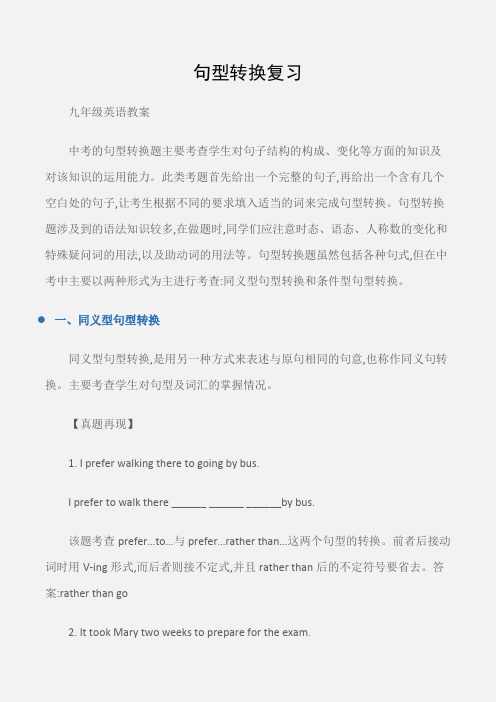
句型转换复习九年级英语教案中考的句型转换题主要考查学生对句子结构的构成、变化等方面的知识及对该知识的运用能力。
此类考题首先给出一个完整的句子,再给出一个含有几个空白处的句子,让考生根据不同的要求填入适当的词来完成句型转换。
句型转换题涉及到的语法知识较多,在做题时,同学们应注意时态、语态、人称数的变化和特殊疑问词的用法,以及助动词的用法等。
句型转换题虽然包括各种句式,但在中考中主要以两种形式为主进行考查:同义型句型转换和条件型句型转换。
一、同义型句型转换同义型句型转换,是用另一种方式来表述与原句相同的句意,也称作同义句转换。
主要考查学生对句型及词汇的掌握情况。
【真题再现】1. I prefer walking there to going by bus.I prefer to walk there ______ ______ ______by bus.该题考查prefer…to…与prefer…rather than…这两个句型的转换。
前者后接动词时用V-ing形式,而后者则接不定式,并且rather than后的不定符号要省去。
答案:rather than go2. It took Mary two weeks to prepare for the exam.Mary ______ two weeks ____________ for the exam.该题考查表示"花费时间做某事"的两个句型的转换,take常用的句型是:It take +时间+ to do…;而spend却是:sb +spend + 时间+ (in)doing…。
答案:spent,in preparing3. I didn't draw so well as he.He ______ ______ than I .题中上句意思为"我没有他画得好",换用另外一种说法是"他比我画得好"。
句型转换公开课教案
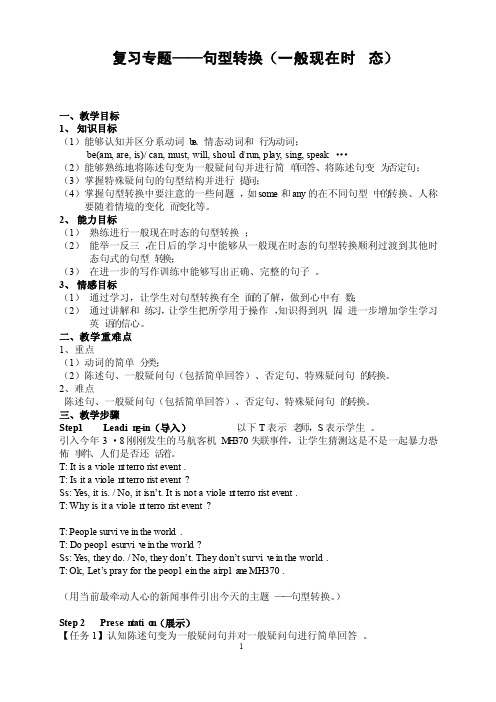
复习专题——句型转换(一般现在时态)一、教学目标1、知识目标(1)能够认知并区分系动词b e、情态动词和行为动词;be(am, are, is)/ can, must, will, should/ run, play, sing, speak···(2)能够熟练地将陈述句变为一般疑问句并进行简单回答、将陈述句变为否定句;(3)掌握特殊疑问句的句型结构并进行提问;(4)掌握句型转换中要注意的一些问题,如some和any的在不同句型中的转换、人称要随着情境的变化而变化等。
2、能力目标(1)熟练进行一般现在时态的句型转换;(2)能举一反三,在日后的学习中能够从一般现在时态的句型转换顺利过渡到其他时态句式的句型转换;(3)在进一步的写作训练中能够写出正确、完整的句子。
3、情感目标(1)通过学习,让学生对句型转换有全面的了解,做到心中有数;(2)通过讲解和练习,让学生把所学用于操作,知识得到巩固,进一步增加学生学习英语的信心。
二、教学重难点1、重点(1)动词的简单分类;(2)陈述句、一般疑问句(包括简单回答)、否定句、特殊疑问句的转换。
2、难点陈述句、一般疑问句(包括简单回答)、否定句、特殊疑问句的转换。
三、教学步骤Step1Leadin g-in(导入)以下T表示老师,S表示学生。
引入今年3·8刚刚发生的马航客机M H370失联事件,让学生猜测这是不是一起暴力恐怖事件、人们是否还活着。
T: It is a violen t terrorist event.T: Is it a violen t terrorist event?Ss: Y es, it is. / No, it isn’t. It is not a violen t terrorist event.T: Why is it a violen t terrorist event?T:People surviv e in the world.T: Do people surviv e in the world?Ss: Y es, they do. / No, they don’t. They don’t surviv e in the world.T: Ok, Let’s pray for the people in the airpla n e MH370.(用当前最牵动人心的新闻事件引出今天的主题——句型转换。
- 1、下载文档前请自行甄别文档内容的完整性,平台不提供额外的编辑、内容补充、找答案等附加服务。
- 2、"仅部分预览"的文档,不可在线预览部分如存在完整性等问题,可反馈申请退款(可完整预览的文档不适用该条件!)。
- 3、如文档侵犯您的权益,请联系客服反馈,我们会尽快为您处理(人工客服工作时间:9:00-18:30)。
句型转换1. My mother is watching TV now. (用sometimes改写)My mother sometimes __________ ________ at home.2. Tom often plays football on Sundays. (划线提问)___________ _________ Tom often _________ on Sundays.3. He sleeps nine hours every night.(划线提问)_________ __________ ________ he sleep every night?4. He didn’t go to school yesterday. I think. (合并为一句)I _________ ________ he ________ _________ school yesterday.5. It’s important that we should eat a balanced diet. (同意句)It’s important _________ _________ _________ __________ a balanced diet.6. What’s the trouble with Tony? (同意句)________ ________ ________ with Tony?7. The boy has to play the piano every day.(一般疑问句)________ the boy _______ ________ play the piano every day?8. We hope that we can visit this place again.(同意句)We hope ________ ________ this place again.9. He decided to buy a new house.(同意句)He decided ________ __________ a new house.10. The Smiths are going to New York on May 10th.(划线提问)_________ __________ ___________ ___________ the Smiths going?11. The early bus takes him to school.(同意句)He __________ __________ __________ _________ to school.12. It took him about an hour to do his homework every day.(同意句)He _________ about an hour _________ __________ his homework every day.13. Lily lives about 10 kilometers from the airport.(划线提问)_________ _________ _________ Lily __________ from the airport.14. It was Friday, the 12th yesterday. (划线提问)_________ __________ yesterday?15. Why don’t you come and play soccer with us?(同意句)_______ __________ come and play soccer with us? 16. They are busy studying for the test.(划线提问)_________ __________ they busy __________ ?17. I’m 13. he is 15.(合并句一句)I’m ________ _________ ________ _________ him.18. Both of us are good at schoolwork.(同意句)_______ are ________ good at schoolwork.19. I have two apples,he has two apples ,too.(合并为一句)I have _______ ________ ________ ________ he.20. I think English is more difficult than the other subjects.(同意句)I don’t think the other subjects are ______ __________ ________ English.21. We need to have much water.(线提问)_________ ___________ you ________ __________ ________ ?22. My mother put in two teaspoons of butter.(划线提问)_________ __________ butter _________ your mother _______ in?23. There were some sharks .(一般疑问句并做否定回答)_______ ________ ________ sharks? No, there _________>24. My sister stayed there for two years.(划线提问)_________ _________ ___________ your sister _________ there?25. He began to learn the accordion when he was five years old.(同意句)________ _______ ________ _______ _______ , he began to learn the accordion.26. She wants to be a computer programmer .(同意句)She ______ __________ ________ _________ a computer programmer.27. The student have a school trip in spring.(用next week 代替spring)The students ________ ________ ________ _________ a school trip next week. 28. He is going to be an engineer when he grows up.(划线提问)_________ is he going to ________ when he grows up?29. I have to stay at home because of the cold weather.(同意句)I have to stay at home _________ ________ _________.30. You took care of my dog when I was not at home . Thank you.(合并为一句)Thanks __________ ______ ________ _______ my dog when I was not at home.31. He is very young. He can’t carry the heavy box.(合并为一句)He is _______ _________ _________ carry the heavy box.32. The car is too expensive for me to buy it.(同意句)The car isn’t________ _____ for me to buy it.33. Jim likes apples better than any other fruit.(同意句)Jim likes apples _______ _________ _________ the fruits.34. He went to Beijing by train.(同意句)He _______ _______ _________ to Beijing.35. Tina bought a gift yesterday.(变为否定句)Tina ________ _________ a gift yesterday.36. Bob won the first prize in the competition three years ago.(划线提问)________ ________ Bob ________ the first prize in the competition?37. The kids are going to the zoo by bike. (划线提问)_______ _________ the kids ________ to the zoo?37. I can buy some drinks and snacks.(改为语气委婉的提问)_______ _________ _________ ___________ __________ ______ _______ ?38. Nobody is more active than Meimei.(同意句)Meimei is __________ __________ __________ of all.39. How much is your T-shirt?(同意句)________ the _________ of your T-shirt?40. Helen has the same idea as Gina.(同意句)Helen _________ __________ Gina.初二英语句型转换练习1.There’s no time to have lunch. ( 改反意疑问句)There’s no time to have lunch, ______ _______?2.What does he often do on Monday?(用last Monday改写)What _____ he _____ last Monday?3.Her brother likes apples very much.( 改否定句)Her brother _______ like apples ______ _______.4.Jim couldn’t find the book on the desk. (改反意疑问句)Jim couldn’t find the book on the desk, ______ ______?5.I don’t think he can move the table. (改反意疑问句)I don’t think he can move the table, ______ ______?6.Both of the boys are good at swimming. (改否定句)_______ of the boys _____ good at swimming.7.It’s wet and hot today. (就划线部分提问)What’s _____ _______ ______ today?8.They lived there for twenty years. (就划线部分提问)______ ______ ______ they live there?9.The teacher is talking with her father. (就划线部分提问) _____ _____ the teacher ________ _______?10.He has to do the washing on Saturday. (就划线部分提问) _____ _____ he ______ to _____ on Saturday?11.You teacher seemed angry. (改反意疑问句)Your teacher seemed angry, ______ ______?12.We went to Wuhan every two years. (就划线部分提问) _______ ______ ______ you ______ to Wuhan?13.My aunt went back ten months ago. (就划线部分提问) ______ ______ your aunt go back?14.My brother has to drive the car. (改一般疑问句)______ _______ brother ______ to drive the car?15.We’ll have to eat mooncakes in the room. (改否定句) We ______ _______ to eat mooncakes in the room.16.He must do it today. (改反意疑问句)He must do it today, ______ _______?17.There is something wrong with the radio. (改否定句) There _____ _________ wrong with the radio.18.Someone is in the room. (改反意疑问句)Someone is in the room, _____ _______?19.The man said nothing for a moment. (就划线部分提问) ______ ______ the man _____ for a moment?20.We can’t find the sign somewhere. (改一般疑问句)______ ______ find the sign __________?21.Both of the stories are interesting. (改否定句)_______ ______ the stories _____ interesting.22.You’d better go out at night. (改否定句)You’d ______ ______ go out at night.23.It’s a terrible cough. (改感叹句)______ ____ _________ cough!24.Either Jim or Kate will go to Hainan for the winter holidays. (否定句) _________ Jim ______ Kate will go to Hainan for the winter holidays.25.Mike watched TV last night. (就画线部分提问)_____ _____ Mike ______ last night?26.You mustn't play on the road. (改为祈使句)______ ______ on the road.27.Must I finish my homework today? (给出否定回答)______, you ______.28.He is a very clever boy. (改为感叹句)______ a ______ boy he ______!= _____ _______ the boy _____!29.Mrs. Green does some shopping every day.(完成反意疑问句)Mrs. Green does some shopping every day ,______ _______?30.His father took him to the park yesterday. (就画线部分提问)______ ______ his father ______ him to the park?31.There is some water in the bottle. (改为否定句)There ______ ______ water in the bottle32.She went to London by air yesterday. (就画线部分提问)______ ______ she ______ to London yesterday?33.You can't leave your son by himself, can you? (给出否定回答)______, I ______.34.The weather is very bad. (改为感叹句)______ ______ weather! 35.We ran to the tree. We couldn't see any more monkeys.(把两个简单句连成一个并列句)We ran to the tree, ______ we couldn't see any more monkeys. 36.It took me two hours to mend the bike. (就画线部分提问)______ ______ ______ it ______ you to mend the bike?37.I turned on the radio. We sat down and listened to the music. (把两个简单句连成一个并列句)I turned on the radio _____ we sat down and listened to the music.38. Turn off the radio. (改反意疑问句)Turn off the radio, _________ ________?39.The boy is so strong. He can carry the heavy box.(把两个句子合并成一个句子)The boy is _________ ________ to carry the heavy box.40. He told me to bring some food. (变成否定句))He ______ me _______ _______ bring ______ food.41.He is a boy of five. He can speak a little English. (连成并列句) He is a boy of five, _______ he can speak a little English.42. Both you and I are happy. (变成否定句)_____ you ________ I ________ happy.43.Swimming is my favourite. (同义句转换)My ________sport is________.44.Let's cook something English. (变成反意疑问句)Let's cook something English,________ ________?45.I like chicken than any of others. (同义句转换)I like chicken _____ ______ ______.47.He likes cabbages. (用tomatoes改成选择疑问句)________ he ________ cabbages ________ ________?48.I’ll tell my father about it tomorrow. (用yesterday 改写句子)I ________ my father about it ________.49.This kind of food is delicious. (变成感叹句)________ ________ this kind of food is!50.There is something interesting in today's newspaper. (变一般疑问句)________ ________ _______ interesting in today's newspaper?51.Tom is writing the new words on the blackboard.(就划线部分提问)________ ________ Tom________?52.They are going to leave at nine. (就划线部分提问)________ ________ are they going to leave?53.Mr. Smith usually goes to work by bike.(就划线部分提问)________ ________ Mr. Smith usually ________ to work?54.Tim always has supper at home.(改为一般疑问句)________Tim ________ ________ supper at home?55..my pencil, your pencil, long (用…than…连成一个句子)_______________________________________________。
